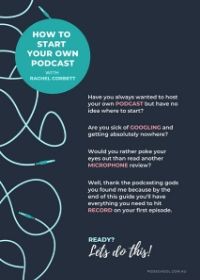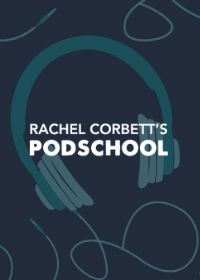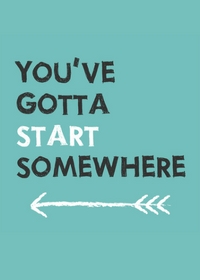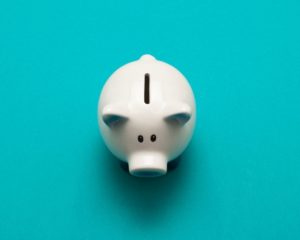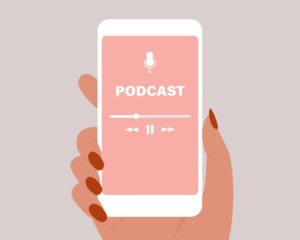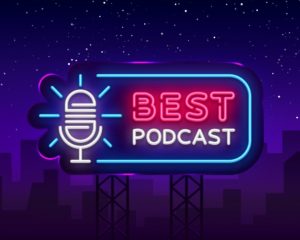
“Can I really start a podcast?”
Of course, you can!
When you’re thinking about starting a podcast it’s easy to let self-doubt get the better of you. Particularly if you’ve never done anything like it before.
Podcasting can be daunting when you don’t know what you’re in for but there are a few simple things you can do to make sure those feelings don’t stop you from starting a show.
Practice
When you decide you want to start a podcast you don’t have to release episodes straight away, even if you’re recording them.
While you should never wait until your show is ‘perfect’ (because you’ll be waiting forever) there’s nothing wrong with getting comfy before you go ‘live’ with your first episode.
Especially if this is the first experience you’ve had with hosting or recording audio.
As with anything new, it takes a while to get your head around the process and to get good at it.
So, if you’ve got your equipment and you’ve got your idea, you can start planning and recording episodes for your ears only.
This will not only help you get into the groove of podcasting and give you a realistic idea of how much time you’ll need to set aside each week, but it’ll also help you feel more confident behind the mic.
And the more confident you feel the more you’ll chip away at those pesky feelings of self-doubt.
If it takes 100 practice episodes to feel like you’re ready to go live, that’s fine!
No one will know how long it took to get there but you.
Plus, you can take all the content you’ve prepared for your practice episodes and use it for the real thing.
Set achievable goals
Podcasting doesn’t have to be something you do every week for the rest of your life.
Some ideas are more suited to seasons which means you can release episodes in smaller chunks rather than releasing an episode every week until the end of time.
Doing your show this way also allows you to take a break in between seasons so you can use this time to plan and record content for the next one or start something new.
Stop stressing about how many people are listening
Of course, everyone wants their podcast to be listened to by millions of people but if you’ve got a small audience there’s absolutely nothing wrong with that.
If you’re stressing about numbers, ask yourself “Why am I doing this?”
If the answer is: “Because I want to be famous,” “Because I want to tell everyone it’s a big success” or “Because I want to quit my job and get paid to host my podcast,” I wouldn’t hand in your letter of resignation just yet.
Building an audience takes time so your main driver needs to be a passion for your content and a desire to provide value for your audience.
Otherwise, you won’t have the motivation required to do the work to get there.
Your podcast also doesn’t need to be all about audience numbers.
Maybe it’s enough that it’s a source of content you can share on social media to build your brand.
Maybe you can use it as an audio showreel to get speaking gigs if you’re an expert in something?
Or maybe it’s just something you’ve always wanted to do and you can feel really bloody proud of yourself for doing it.
A podcast doesn’t have to have a million listeners to be successful so don’t make the mistake of setting unrealistic expectations or comparing yourself to others.
Just start from a desire to get your content out into the world the let the rest unfold.
Improve your skills
One of the reasons most people don’t succeed in podcasting is because they don’t arm themselves with enough information before they jump in.
Building up your knowledge around podcasting and how to be successful at it is really important if you want to give yourself the best chance of success.
You can do that via podcast-specific training like my online podcasting course, PodSchool, where you get taken through everything step by step.
You could find a radio school in your local area and get some training in how to be a better presenter.
You could volunteer at a community radio station where you can watch people broadcast and maybe even work on a show yourself so you get more familiar with coming up with content.
Or you can research as much as you can (there’s plenty of information on my website and podcast) and practice, practice, practice so you feel more confident when it comes time to release your first episode.
Got a burning podcasting question you’d like answered? Ask it here.
Want to start your own podcast but need a little help? Download my “How To Start A Podcast” guide or sign up for my online podcasting course, PodSchool.
[00:00:00] Hello and welcome to the show and greetings from exceptionally hot Queensland in Australia. Right now I am staying with some family and I am huddled away in the corner of my bedroom with a couple of pillows wrapped around my microphone and I've had to turn off the fan and shut all the windows to make sure that the sound is as good as it possibly can be. As a consequence I'm currently coming to you live from a sweatbox so if everything goes silent at any point in this episode you'll know I've passed out from heat exhaustion. Fingers crossed I make it all the way through to the end. Today's episode comes from a question I received on email from Natalia, she was asking about how you get rid of self-doubt when it comes to starting a podcast. This is a huge thing for a lot of people who have never done any broadcast or podcasting or radio before. It's very daunting to sit in front of a microphone to record your voice, put something out into the Internet and ask people to listen to it. And it's easy to understand why people don't go through with it because of the fear of it not being a success at the end.
[00:01:20] But if you're struggling with self-doubt about whether or not you can start your own podcast I just wanted to talk through a few different ways to think about what you're doing and also some of the things that you can do to set yourself up for success.
[00:01:41] 1. Practice.
[00:01:44] This isn't a radio show and when you decide you're going to podcast and you set your gear up and you have your microphone there and you prep your content and you record your episode none of what you record has to be made public. So my first piece of advice would be don't tell people you're going to a podcast until you're ready to do it. Having said that sometimes it is great to have that accountability where you say okay this is going to be out by March. And to make sure that people hold you to that but when you're just starting out give yourself a bit of a break and realise that you can record episodes at home and practice getting into the schedule, putting content together and listen back to what you're doing and see what's working and see what's not. If that takes you six months to a year that's fine. Podcasting will still be here and better you release something that you feel is up to scratch. It doesn't need to be perfect that's for sure but just where you feel "okay I think I'm getting in the swing of this a little bit" because while waiting for perfection is never going to be something that you should do and you should always leap quicker than you're ready to at the same time there is something to be said, if you are coming at this from nothing, for spending time getting comfortable behind the mic. Then all of that content you do whether it takes you six episodes or 100 episodes can be used again because nobody's hearing it and when you do it a second time or third time it will be in much better shape than the first time you did it. So really make the most of the fact that nobody needs to hear what you're doing and that you actually have an ability to record and practice in front of a microphone and to do the episodes as if they were going to go live but to spend that time getting comfortable. So make sure you're a bit kind to yourself and understand that this isn't something that if you decide you want to do it you have to do it tomorrow. Practice and use that ability to record yourself and listen back to get yourself a bit more comfortable so that you feel more confident getting into it and actually asking people to listen to what you're shipping out.
[00:04:36] 2. Committ to something achievable.
[00:04:36] Podcasting doesn't need to be an every week commitment for the rest of your life. I feel like some people think that once they start they can not stop and they'll be on the hamster wheel and that you've got to come up with content forever and ever and ever. And yes there are podcasts that have been running for years and doing that but there are super successful podcasts with only six episodes and are still continually getting listened to because people are still finding them. So if you feel like you want to give something a try but you're scared about whether you can commit to it in the long term. Maybe your idea is better suited to a six part season and you can trial the first six parts and do those six episodes and then maybe you get into the groove of it and you think "oh my goodness I could totally do this every week" or alternatively maybe you think "okay that's six weeks done then I'll come back in another month and I'll do another six episodes" or maybe just do that six episode season and that wraps up really nicely in a tight little bow and then you can go on to one of your other ideas. So don't set yourself up for the expectation that you have to be podcasting for the rest of your life. Granted podcasting is a really long term goal so if you're just starting out the idea of maybe having six episodes and building a gigantic audience off that isn't necessarily going to happen. However you also do need to get your flying hours up a little bit and so maybe if you just set yourself a more achievable goal it's not going to be so terrifying. And if nobody listens. What's the big deal. This is really where it comes back to your why - why are you doing this podcast? If you are doing it because you think "I want to leave my job this is how I'm going to make my money" then please stay with your job because money doesn't always come at the end of a podcast. If you're doing it because you think you should be jumping on the bandwagon because it's rolling by, wait until the time is right for you.
[00:06:35] Podcasting will be here when you're ready for it but it's really important that the reason you're doing this show is because you feel passionate about the content and because you think there's an audience out there who'll really benefit from it. That's got to be the reason for doing it so that at the end of the day you'll be happy if one person listens to it or one million people listen to it. Don't set yourself up for unrealistic expectations or go into this with the end goal in mind because you just never know where this is going to end up. It might be something that you do for six months and say "okay that's maybe not for me." Or alternatively it might gain momentum and you might think "oh my goodness I'm really onto something here!" You just have to start from that initial desire to make the content and let the rest unfold. So just make sure you're doing it for the right reasons and not expecting the outcome because you just really never know where it's going to end up.
[00:07:45] 3. Get some training.
[00:07:45] If you're somebody who likes to know where the furniture is a bit before they actually jump in. Of course you could do my online podcasting course PodSchool.com.au or you could go and volunteer at your local community radio station. They're very very good at being open to volunteers coming in and teaching people and training people up and you can see how radio works and how people present on air and get a little bit of a an understanding of the behind the scenes.
[00:08:16] Alternatively if there's a radio school in your neighborhood or nearby you could go and do a short course or a longer course and get some skills. Just to give you that tiny bit more confidence that makes you feel like "okay I'm not going into this totally blind. I can actually do this because I know what needs to be done" so that can be a really good way to give yourself some confidence and you can of course find all the information about my online podcasting course PodSchool at the podschoolpodcast.com website.
[00:09:02] So Natalia I hope that has helped to think a little bit differently about jumping in the deep end and if you are having doubts about your ability or whether you can do this remember that you don't have to turn up to a radio studio and do a shift in front of a million people. This is a private exercise until you decide it's time to go public so get your equipment and take the opportunity to really practice and get to a point where you feel like you're ready to let your show out into the world. You've totally got this. I have complete faith in you and I know that you can do it. Thanks so much for listening to this episode.
[00:09:38] If you have any questions just like Natalia did please send me an e-mail at the contact page at podschoolpodcast.com. If you're finding these tips helpful I would love it if you would leave a review wherever you listen to podcasts. It just helps other people find the show. Right! It is time to dab this sweat moustache and sweat beard away. See you next week until then, happy podcasting.



